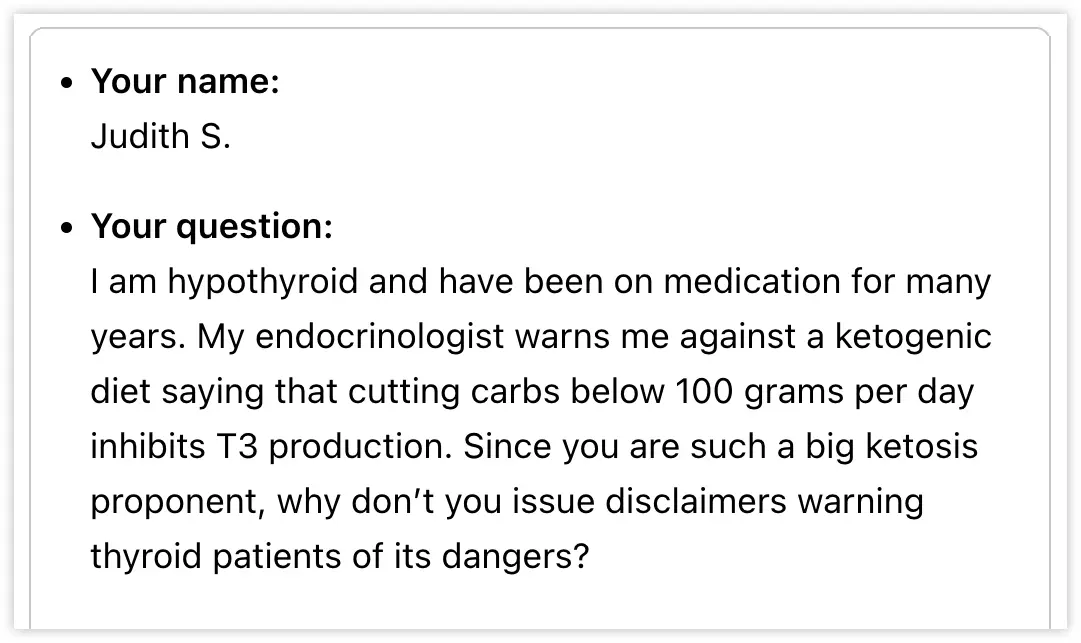Does a Ketogenic Diet Harm the Thyroid? Dr. Bikman Responds to a Concerned Follower
Mar 23, 2025
SUMMARY:
When longtime thyroid patient Judith asked why Dr. Bikman doesn’t warn people with hypothyroidism about ketogenic diets, he responded with a detailed and respectful defense. Ben explains why the science doesn’t support the idea that keto harms thyroid function—and how we may actually be seeing signs of improved sensitivity, not damage.
Recently, one of our valued Insider subscribers, Judith, asked an important and heartfelt question about thyroid health and ketogenic diets:

Dr. Bikman offered this response:
As a Reminder... You can use the “gear” icon at the bottom of the video to watch at various speeds.
Judith, who has been on thyroid medication for many years, said her endocrinologist warned her that eating fewer than 100 grams of carbohydrates per day could suppress T3 production and potentially worsen thyroid function. So, she asked: Why doesn’t Dr. Bikman issue disclaimers warning thyroid patients of this risk?
Dr. Bikman acknowledged the concern and began by clarifying his role—not as a physician, but as a scientist—and emphasized that he does not promote ketosis as a universal lifestyle. Rather, he defends it when misinformation arises, as he believes it has been unfairly criticized.
He then addressed the thyroid concern directly.
Yes, there is evidence showing that thyroid hormone levels can drop slightly on a ketogenic diet. However, what matters more is whether TSH (thyroid-stimulating hormone) rises in response. It doesn’t.
According to Dr. Bikman, if the thyroid were truly being impaired, TSH levels would go up. That’s how the body signals the thyroid to increase output. The fact that TSH remains normal indicates that the body is not perceiving a problem—suggesting that the system is still functioning well.
He went on to draw a comparison to insulin resistance. When someone reduces carbs and becomes more insulin sensitive, insulin levels drop. But we don’t interpret that as damage to the pancreas—we see it as an improvement in function. The same reasoning can apply to the thyroid: lower levels of thyroid hormone may simply reflect better thyroid sensitivity, not harm.
“There is no evidence,” Dr. Bikman concluded, “to show that a ketogenic diet harms the thyroid.”
He expressed gratitude for the question, which gave him a chance to clarify this common concern for others as well.
References:
- Obese individuals tend to have higher levels of thyroid activity: https://academic.oup.com/jcem/article/95/8/3614/2596481
- Obese people may have a resistance to thyroid hormone: https://onlinelibrary.wiley.com/doi/epdf/10.1002/oby.24084
- With these studies in mind, our view that a lower thyroid level with weight loss and a ketogenic diet may reflect improved sensitivity to thyroid: https://journals.plos.org/plosone/article?id=10.1371%2Fjournal.pone.0269440&utm_source
If you’ve ever wished you could sit down with Ben and ask your own questions, you can. Becoming a Pro Insider gives you access to these exclusive engagement opportunities with Dr. Bikman, the Insulin IQ team, and the remarkable, likeminded community. Learn more by clicking on the link below:


